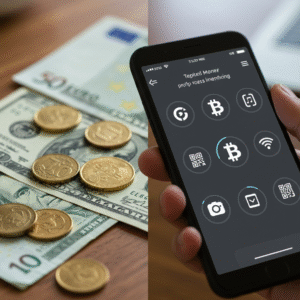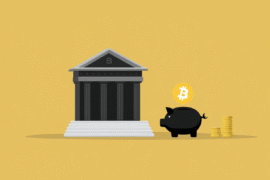This article may contain references to products or services from one or more of our advertisers or partners. We may receive compensation when you click on links to those products or services. Nonetheless, our opinions are our own.
The information presented in this article is accurate to the best of our knowledge at the time of publication. However, information is subject to change, and no guarantees are made about the continued accuracy or completeness of this content after its publication date.
- Why Legal Protections May Fail in Cryptocurrency Breaches Like the Coinbase Hack
- The Coinbase Breach: A Cautionary Example for Digital Investors
- Where Legal Safeguards Fall Short in Digital Asset Security
- Investor Responsibility in a Loosely Regulated Landscape
- Financial Implications of Platform Hacks
- Building Resilience: Cybersecurity Planning for Crypto Investors
- Diversifying Beyond Digital Currency
- FAQs on Cryptocurrency Security and Liability
- Conclusion: A Call for Informed Risk Management
- Recommended Reads
Why Legal Protections May Fail in Cryptocurrency Breaches Like the Coinbase Hack
The expanding use of digital assets has redefined the concept of ownership and storage. Yet, while platforms like Coinbase offer users a gateway into the crypto asset class, recent cybersecurity incidents have made one issue increasingly evident: legal protections may not adequately shield users when platforms are compromised. Despite existing regulatory structures, the complexity of cryptocurrency systems often leaves investors vulnerable when breaches occur.
The Coinbase Breach: A Cautionary Example for Digital Investors

In early 2024, Coinbase confirmed a sophisticated phishing attack targeting its employees. According to company reports and media outlets, including Reuters and Bloomberg, the attackers exploited a vulnerability in a third-party system to send phishing emails. While Coinbase acted swiftly and reported no customer funds were lost in this specific breach, the situation reignited concerns about how well users are protected under current laws when broader attacks succeed.
This was not the platform’s first encounter with user-impacting incidents. In prior years, unauthorized access to individual accounts, often facilitated through social engineering, resulted in losses that were not always reimbursed. Coinbase’s user agreement outlines liability limits, placing significant responsibility on users to secure their accounts.
Where Legal Safeguards Fall Short in Digital Asset Security
Traditional banking regulations, such as those enforced under the FDIC for U.S. financial institutions, do not cover most cryptocurrency exchanges. Crypto platforms, including Coinbase, operate in a hybrid regulatory landscape with limited oversight and evolving compliance requirements.
Legal Protection Gaps
| Issue | Explanation |
|---|---|
| Limited Regulatory Coverage | Digital assets are not protected by traditional banking protections, such as the FDIC. |
| Jurisdictional Complexity | Exchanges often operate on a global scale, complicating cross-border legal claims. |
| User Agreement Limitations | Liability caps often shift financial risk to the user. |
| Slow Litigation Processes | Even when remedies exist, court proceedings may take years to resolve. |
The nature of cryptocurrency, pseudonymous, decentralized, and fast-moving, often places it outside the reach of conventional legal mechanisms, particularly in cases involving theft or fraud.
Investor Responsibility in a Loosely Regulated Landscape
Given the limitations of legal recourse, users must take proactive steps to reduce exposure to potential breaches. Financial advisors and cybersecurity specialists emphasize the importance of maintaining a diversified security strategy for managing cryptocurrency assets, particularly on exchange platforms.
Best Practices for Digital Asset Safety
- Use cold wallets: Hardware wallets offer offline storage, making assets less susceptible to remote breaches.
- Enable multi-factor authentication: Combining SMS-based and app-based two-factor authentication (2FA) adds significant login security.
- Avoid phishing links: Always verify URLs and use bookmarks to access exchange platforms.
- Review account permissions: Revoke unused API keys or third-party integrations that increase risk exposure.
Establishing a secure environment for managing digital assets is not only advisable, it has become a practical necessity.
Voted "Best Overall Budgeting App" by Forbes and WSJ
Monarch Money helps you budget, track spending, set goals, and plan your financial future—all in one app.
Get 50% OFF your first year with code MONARCHVIP
Financial Implications of Platform Hacks
In the absence of standardized protections, the burden of loss in a crypto-related breach frequently rests on the user. Many platforms offer “reimbursement policies,” but these are typically discretionary. The ambiguity surrounding terms like “due diligence” and “reasonable user behavior” often leads to inconsistent compensation outcomes.
Even well-funded exchanges may delay or deny claims if they determine that account security lapses originated on the user’s side. As reported by CNBC in prior incidents, affected users often spend months pursuing claims or find themselves navigating arbitration with limited success.
Building Resilience: Cybersecurity Planning for Crypto Investors
Rather than relying solely on external protections, individuals investing in cryptocurrencies should formalize a routine for evaluating and updating their digital security posture.
Cybersecurity Maintenance Schedule
| Task | Frequency | Status |
|---|---|---|
| Change login passwords | Every 90 days | In progress |
| Review exchange permissions | Monthly | Completed |
| Update wallet firmware | Biannually | Pending |
Creating such a schedule helps maintain an active defense against evolving digital threats and ensures long-term portfolio stability.
Diversifying Beyond Digital Currency
In the context of risk management, diversification is not limited to asset types, and it also applies to asset locations and storage strategies. Consolidating all holdings within a single exchange can significantly elevate vulnerability.
Allocation Table
| Asset Type | Value (USD) | Platform or Method |
|---|---|---|
| Cryptocurrency | $6,000 | Ledger hardware wallet |
| Stablecoins | $2,500 | Coinbase + MetaMask |
| Stocks | $10,000 | Charles Schwab Brokerage |
| Cash Reserve | $3,000 | High-Yield Savings Account |
Strategic allocation reduces the impact of a single point of failure and strengthens overall portfolio resilience.
FAQs on Cryptocurrency Security and Liability
What was the nature of the most recent Coinbase breach?
In 2024, attackers launched a phishing campaign targeting Coinbase employees, exploiting a third-party system. The company confirmed that there were no direct customer losses, but the breach raised concerns about the security of user data and assets in more advanced attacks.
Does the law guarantee compensation for cryptocurrency losses?
Not necessarily. Cryptocurrency holdings are typically not insured or protected by federal agencies like the FDIC. Most exchanges include liability limitations in their terms, and laws addressing digital asset theft remain underdeveloped.
Can users take legal action after a platform breach?
While legal action is possible, outcomes vary. Cross-border jurisdiction issues and arbitration clauses often complicate or limit the availability of legal remedies. Resolution times can also be lengthy.
What proactive steps should digital investors take?
Investors should utilize offline storage for extensive holdings, enable multi-layered authentication on all accounts, refrain from sharing login credentials, and stay informed about current phishing and scam tactics.
Conclusion: A Call for Informed Risk Management
In a sector characterized by innovation and volatility, relying on outdated regulatory systems or platform assurances is insufficient. Cryptocurrency users must actively manage their own risk through secure practices, diversification, and regular reviews of account activity. While legislation may eventually evolve, individual vigilance remains one of the most reliable defenses against unauthorized access and asset loss.

Reviewed and edited by Albert Fang.
See a typo or want to suggest an edit/revision to the content? Use the contact us form to provide feedback.
At FangWallet, we value editorial integrity and open collaboration in curating quality content for readers to enjoy. Much appreciated for the assist.
Did you like our article and find it insightful? We encourage sharing the article link with family and friends to benefit as well - better yet, sharing on social media. Thank you for the support! 🍉
Article Title: Coinbase Hack Shows the Law Probably Won’t Protect You: Here’s Why
https://fangwallet.com/2025/06/09/coinbase-hack/The FangWallet Promise
FangWallet is an editorially independent resource - founded on breaking down challenging financial concepts for anyone to understand since 2014. While we adhere to editorial integrity, note that this post may contain references to products from our partners.
The FangWallet promise is always to have your best interest in mind and be transparent and honest about the financial picture.
Become an Insider

Subscribe to get a free daily budget planner printable to help get your money on track!
Make passive money the right way. No spam.
Editorial Disclaimer: The editorial content on this page is not provided by any of the companies mentioned. The opinions expressed here are the author's alone.
The content of this website is for informational purposes only and does not represent investment advice, or an offer or solicitation to buy or sell any security, investment, or product. Investors are encouraged to do their own due diligence, and, if necessary, consult professional advising before making any investment decisions. Investing involves a high degree of risk, and financial losses may occur including the potential loss of principal.
Source Citation References:
+ Inspo
There are no additional citations or references to note for this article at this time.












































